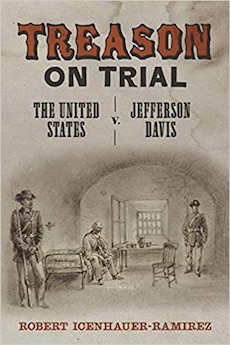By Louis J. Kern
Robert Icenhauer-Ramirez provides a detailed assessment of the personal and political motivations of those tasked with the treason prosecution of Jefferson Davis that meshed with the equivocal national mood seeking retribution, reconciliation, and closure. He argues that Reconstruction historians have largely ignored the case but cites mostly pre-1950 texts, failing to mention recent studies—Clint Johnson’s The Chase, Prosecution, and Surprise Release of Confederate President Jefferson Davis (2008), and Cynthia Nicoletti’s Secession on Trial: The Treason Prosecution of Jefferson Davis (2017).
Legally, the Davis prosecution was problematic. It was uncertain whether the government could secure a conviction, and there was considerable doubt about its desirability. Officials were split between the revanchists—the Radical Republicans in Congress, Secretary of War Edwin Stanton, and President Andrew Johnson, who declared that “treason should be made odious”—and jurisprudential figures who feared a loss would legitimize secession and who saw reconciliation as the better part of valor—Attorney General James Speed, William M. Evarts, Richard Henry Dana (the prosecution team), and Chief Justice of the Supreme Court, Salmon P. Chase, who refused to oversee the trial.
The questions raised by the case were momentous. Had the conflict been a rebellion or an internecine war? Was secession constitutionally legal? If so, would armed resistance to the U.S. government constitute treason? Did abuse of Union soldiers in Confederate prison camps and the assassination of a president constitute grounds for capital punishment? Did the trial and execution of Andersonville commandant Henry Wirtz provide a model for the Davis case? What relevance did the precedence of the Aaron Burr treason trial (1804) have? Did the parole of Confederate soldiers given by Grant at Appomattox extend to civilian rebels? Did the confiscations and blanket political disqualifications of all rebels in section 3 of the 14th Amendment satisfy the demands of judicial punishment? Would Davis be tried under the constitutional standard (Art.III, Sect.3)—Congress would assess punishment—or the Treason Act of 1862 prescribing the death penalty or, at the court’s discretion, imprisonment and a monetary fine?
Government prosecutors feared acquittal, legitimizing secession and undermining the unity and national predominance secured by blood. Possibility of prosecutorial failure loomed large given the constitutional requirement (Art.III, Sect.2) that all crimes should be tried in the state in which they were committed. The Confederate seat was Richmond; a civil trial would be held in Virginia with a local jury. Trial by military commission, used in the trials of the Lincoln conspirators and Henry Wirz, was rejected by the prosecution.
Davis did not endear himself to federal authorities. After the final surrender of all Confederate forces he fled, vowing to fight on. Imprisoned two years, then paroled, subsequent to President Johnson’s “universal amnesty and pardon … [and] full pardon and amnesty for the offense of treason against the United States,” the government filed a nolle prosequi in the Davis case (1869).
Davis remained unrepentant, refused to apologize, and his publications romanticized the Confederacy, substantiating the “lost Cause.” Failure of the treason trial confirmed the South in the belief that secession was a righteous cause.
In the end no one was convicted of treason (some thirty men had been accused, including Robert E. Lee), and Icenhauer-Ramirez argues that failure to prosecute Davis was essential to reconciliation and was “a triumph of American jurisprudence.” But the price of that reconciliation has been high. Failure to prosecute Davis has legitimized an unrepentant South that ultimately won the moral contest of the war, a victory cemented by the capitulation of the party of Lincoln to a racist ideology in the twentieth century.
Louis J. Kern (ΦBK, Clark University) is professor emeritus of history at Hofstra University. Hofstra University is home to the Omega of New York chapter of Phi Beta Kappa.




